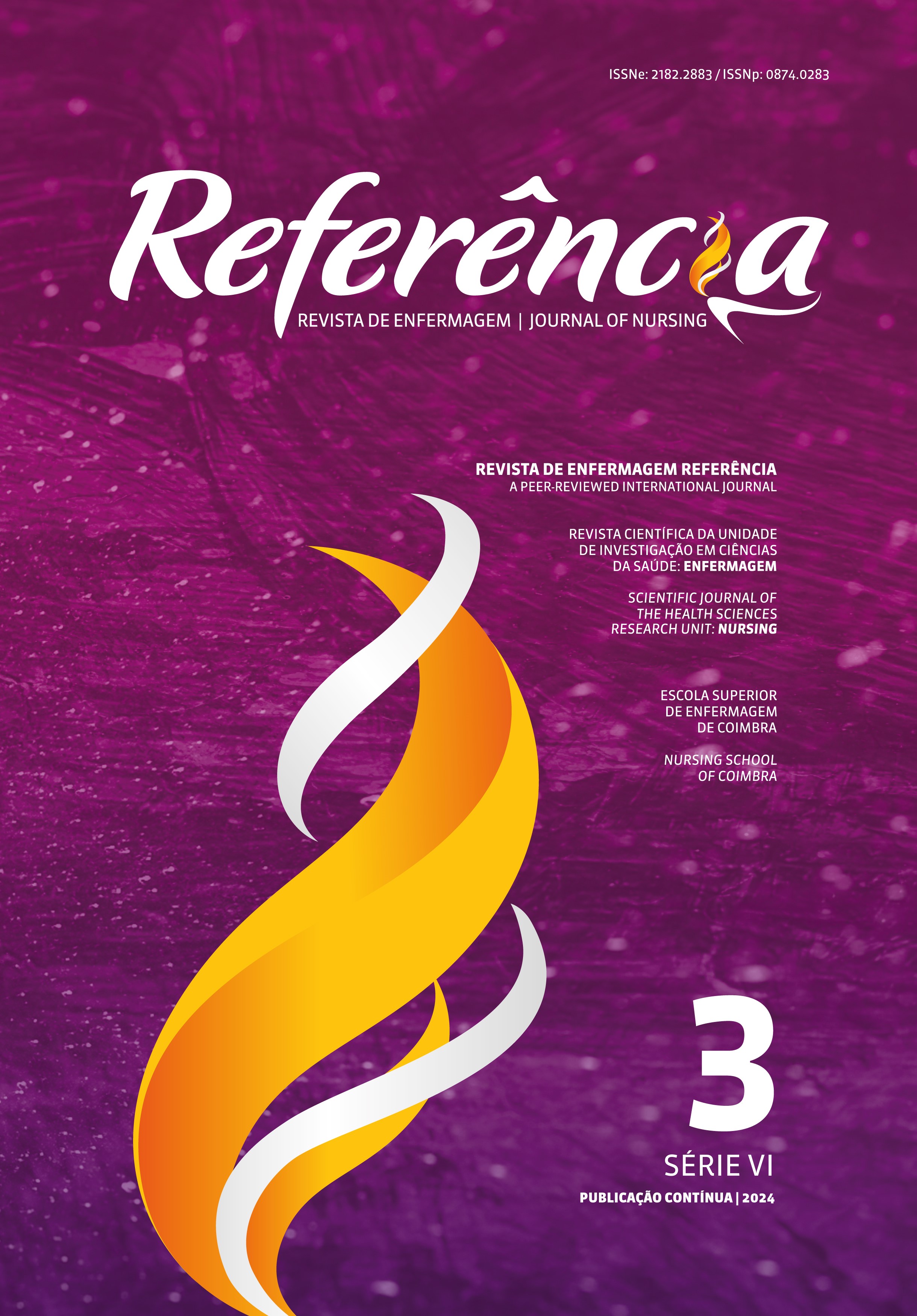Transição do estudante para o ensino superior: um estudo sobre autoeficácia, stresse e bem-estar psicológico
DOI:
https://doi.org/10.12707/RVI23.99.32553Palavras-chave:
enfermagem, ensino superior, estudantes, autoeficácia, stress, bem-estar psicológicoResumo
Enquadramento: A transição para o ensino superior (ES) representa uma etapa crítica, com múltiplos novos e exigentes desafios, que podem precipitar dificuldades adaptativas e desequilíbrios na saúde mental dos estudantes.
Objetivo: Descrever a correlação entre variáveis sociodemográficas/académicas e autoeficácia geral, stresse percebido e bem-estar psicológico em estudantes do primeiro ano da Licenciatura em Enfermagem (LE).
Metodologia: Estudo descritivo-correlacional, amostra não probabilística, tipo acidental de 263 estudantes do primeiro ano da LE 2019/2020, instrumentos: Questionário Sociodemográfico Académico, Escala de Autoeficácia Geral, Escala de Stresse Percebido-10 Itens, Escala de Medida de Manifestação de Bem-Estar Psicológico.
Resultados: Verifica-se existência de correlação negativa entre autoeficácia geral e stresse percebido, entre stresse percebido e bem-estar psicológico, constatando-se ainda correlação positiva entre autoeficácia geral e bem-estar psicológico nos estudantes da LE.
Conclusão: O ambiente de transição para o ES é complexo e impactante para os estudantes, sendo fundamental desenvolver estratégias facilitadoras, que diminuir o impacto de fatores indutores de stresse e o sofrimento emocional nesta população.
Downloads
Referências
Akram, U., Ypsilanti, A., Gardani, M., Irvine, K., Allen, S., Akram, A., Drabble, J., Bickle, E., Kaye, L., Lipinski, D., Matuszyk, E., Sarlak, H., Steedman, E., & Lazuras, L. (2020). Prevalence and psychiatric correlates of suicidal ideation in UK university students. Journal of Affective Disorders, 272, 191-197. https://doi.org/10.1016/j.jad.2020.03.185
Almeida, J. (2014). A saúde mental global, a depressão, a ansiedade e os comportamentos de risco nos estudantes do ensino superior: Estudo de prevalência e correlação [Tese de doutoramento]. Universidade Nova de Lisboa.
Bandura, A. (1997). Self-efficacy: The exercise of control. W. H. Freeman and Company.
Burger, K., & Samuel, R. (2017). The role of perceived stress and self-efficacy in young people’s life satisfaction: A longitudinal study. Journal of Youth and Adolescence, 46, 78-90. https://doi.org/10.1007/s10964-016-0608-x
Candeias, A. A., Alves, A. R., Assis, C., Fernandes, C., Dias, C., & Pereira, R. (2019). Bem-estar e vulnerabilidade ao stresse em estudantes do ensino superior. In A. Candeias (Coord.), Desenvolvimento ao longo da vida: Aprendizagem, bem-estar e inclusão (pp. 147-161). Universidade de Évora. http://hdl.handle.net/10174/27275
Cohen, S., Kamarck, T., & Mermelstein, R. (1983). A global measure of perceived stress. Journal of Health and Social Behavior, 24(4), 385-396. https://doi.org/10.2307/2136404
Eisenberg, D., Hunt, J., & Speer, N. (2013). Mental health in american colleges and universities: Variation across student subgroups and across campuses. The Journal of Nervous and Mental Disease, 201(1), 60-67. https://doi.org/10.1097/NMD.0b013e31827ab077
Gall, T. L., Evans, D. R., & Bellerose, S. (2000). Transition to first-year university: Patterns of change in adjustment across life domains and time. Journal of Social and Clinical Psychology, 19(4). https://doi.org/10.1521/jscp.2000.19.4.544
Hussain, R., Guppy, M., Robertson, S., & Temple, E. (2013). Physical and mental health perspectives of first year undergraduate rural university students. BMC Public Health, 13(848). https://doi.org/10.1186/1471-2458-13-848
Kang, H. K., Rhodes, C., Rivers, E., Thornton, C. P., & Rodney, T. (2020). Prevalence of mental health disorders among undergraduate university students in the United States: A review. Journal of Psychosocial Nursing and Mental Health Services, 59(2), 17-24. https://doi.org/10.3928/02793695-20201104-03
Keane, M. C., & Morgan, B. S. (1991). Perceived self-efficacy and language differences. Psychological Reports, 69(1), pp. 291-298. https://doi.org/10.2466/pr0.1991.69.1.291
Lopes, M. (2019). Abandono escolar no ensino superior: Levantamento das ocorrências no instituto politécnico de Bragança e análise dos fatores concorrentes [Dissertação de mestrado]. Instituto Politécnico de Bragança, Escola Superior de Educação.
Luhmann, M., Hofmann, W., Eid, M., & Lucas, R. E. (2012). Subjective well-being and adaptation to life events: A meta-analysis. Journal of Personality and Social Psychology, 102(3), 592-615. https://doi.org/10.1037/a0025948
Lucas, R. E. (2007). Long-term disability is associated with lasting changes in subjective well-being: Evidence from two nationally representative longitudinal studies. Journal of Personality and Social Psychology, 92(4), 717-730. https://doi.org/10.1037/0022-3514.92.4.717
Massé, R., Poulin, C., Dassa, C., Lambert, J., Bélair, S., & Battaglini, A. (1998). The structure of mental health: Higher-order confirmatory factor analyses of psychological distress and well-being measures. Social Indicators Research, 45, 475-504. https://doi.org/10.1023/A:1006992032387
Meleis, A. I. (2007). Theoretical nursing: Development and progress (4ª ed.). Lippincott Williams & Wilkins.
Monteiro, S., Tavares, J., & Pereira, A. (2012). Adaptação portuguesa da escala de medida de manifestação de bem-estar psicológico com estudantes universitários – EMMBEP. Psicologia, Saúde & Doenças, 13(1), 66-77. https://scielo.pt/pdf/psd/v13n1/v13n1a06.pdf
Mortier, P., Cuijpers, P., Kiekens, G., Auerbach, R. P., Demyttenaere, K., Green, J. G., Kessler, R. C., Nock, M. K., & Bruffaerts R. (2018). The prevalence of suicidal thoughts and behaviours among college students: A meta-analysis. Psychological Medicine, 48(4), 554-565. https://doi.org/10.1017/S0033291717002215
Organization for Economic Cooperation and Development. (2019). Education at a glance 2019: OECD indicators. https://doi.org/10.1787/f8d7880d-en
Organização Mundial de Saúde. (2012). Risks to mental health: An overview of vulnerabilities and risk factors: Background paper by who secretariat for the development of a comprehensive mental health action. https://www.who.int/publications/m/item/risks-to-mental-health
Pais-Ribeiro, J. (1995). Adaptação de uma escala de avaliação da auto-eficácia geral. In, Livro de Atas: Avaliação psicológica: Formas e contextos [Conferência]. 3ª Conferência Internacional “Avaliação Psicológica: Formas e Contextos”, Braga, Portugal. https://doi.org/10.13140/2.1.3971.1682
Sá, C., Sin, C., Pereira, F., Aguiar, J., & Tavares, O. (2021). Estudantes nacionais e internacionais no acesso ao ensino superior: Quem são, que escolhas fazem e como acedem ao mercado de trabalho. Fundação Belmiro de Azevedo. https://www.researchgate.net/























